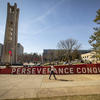We learn it by living it, together.
Diversity is our reality at Klein College, evident through our student body and by the city we call our classroom. Equity and inclusion are ultimately what we want to accomplish as a college. Diversity, equity and inclusion (DEI) is an ongoing conversation among and between our students, faculty, alumni and staff.

